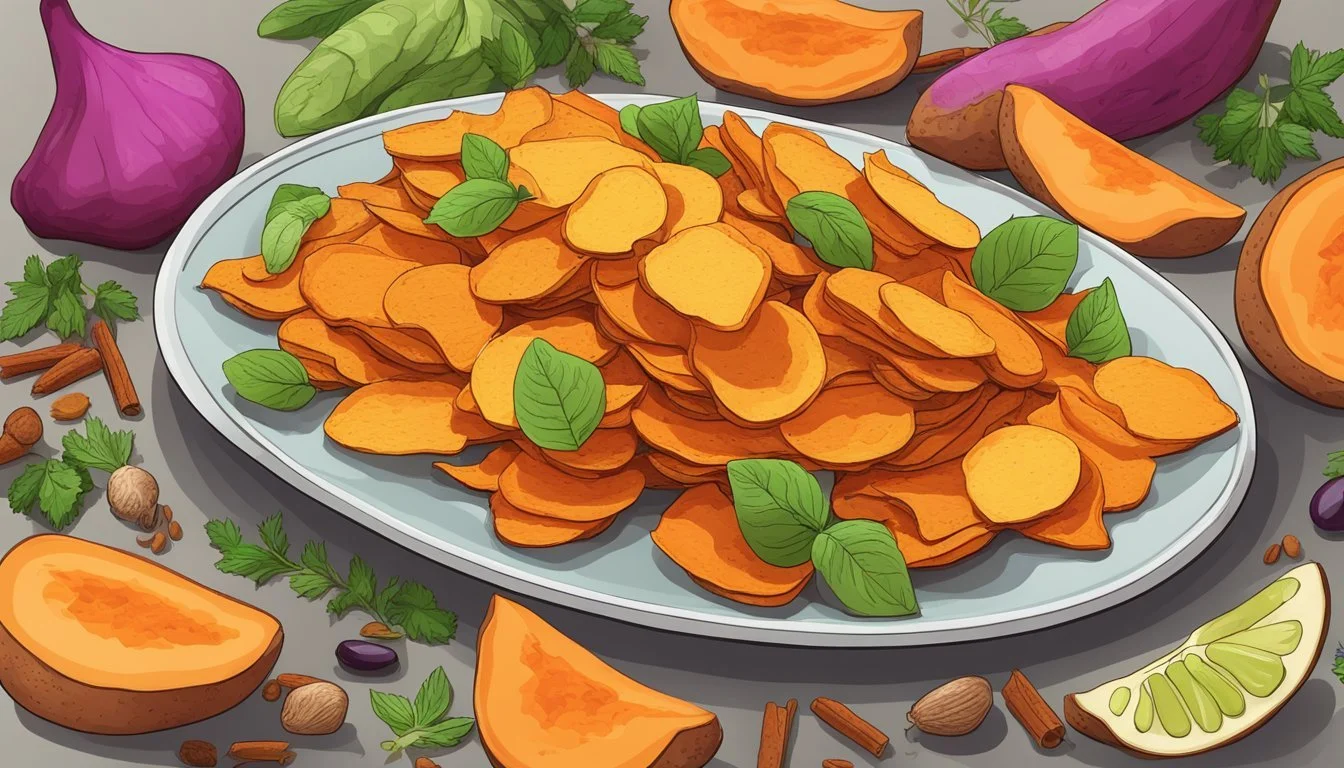Sweet Potato Skin Chips
A Vitamin-Rich Snack and Healthy Crunch Alternative
Sweet potato skin chips offer a nutrient-dense alternative to traditional potato chips. Unlike the common snack which often contains minimal dietary fiber, sweet potato skins are a rich source of this essential nutrient. As people look for healthier snacking options, turning to the outer layer of sweet potatoes (What wine goes well with potatoes?) provides a crisp and satisfying choice that packs not only fiber, but also important vitamins and minerals.
They are simple to prepare and can be enjoyed in a variety of ways, whether baked, roasted, or even fried for a crunchier texture. Cooking them until they are crispy and brown brings out a natural sweetness that complements the savory flavor profile. By utilizing the skins, which are frequently discarded, home cooks and manufacturers alike tap into a serving of wholesome goodness that might otherwise be overlooked.
Sweet potato skins are not only a canvas for a variety of flavors and seasonings but also a smarter option for those mindful of their health. They contain beneficial nutrients like vitamin A, vitamin C, and potassium. Snackers can indulge in these chips knowing they are contributing to their overall well-being, satisfying both taste and nutritional needs.
Sweet Potato Basics
Sweet potatoes are a nutrient-dense root vegetable prized for their multitude of health benefits. Offering a rich array of vitamins and minerals, they stand out in both savory and sweet culinary applications.
Nutritional Profile
Sweet potatoes are an excellent source of vitamin A, particularly in the form of beta-carotene, which the body converts into the active vitamin. They are also a good source of fiber, which supports digestive health. Significantly, they contain vitamin C, potassium, calcium, iron, and protein, as well as beneficial antioxidants.
Nutrient Benefit Vitamin A Supports vision and immune health Fiber Aids in digestion and satiety Potassium Essential for muscle and nerve function Calcium Crucial for bone health Iron Vital for blood production Vitamin C Important for skin and tissue health Antioxidants Protects cells from oxidative damage
Sweet Potato vs Yams
Although oftentimes confused, sweet potatoes and yams are distinctly different. Sweet potatoes (Ipomoea batatas) typically have smooth, thin skins and a sweet, creamy interior. In contrast, yams, which are less common outside of Africa and parts of Asia, have rough, bark-like skin with starchy, drier flesh.
Varieties of Sweet Potatoes
There are several varieties of sweet potatoes, each with unique tastes and textures:
Beauregard: Common in the U.S., known for its purplish-red skin and vibrant orange flesh.
Garnet: Another red-skinned, orange-fleshed variety, but with a sweeter taste.
Jewel: Similar to Beauregard but with a lighter skin and has a moist texture perfect for mashing.
Sweet potatoes can be utilized in a plethora of recipes, from baked or mashed sweet potatoes to sweet potato fries and chips. Each variety lends itself to different culinary uses, enhancing dishes with its respective flavor and texture qualities.
Health Benefits of Sweet Potato Skins
Consuming sweet potato skins can contribute significantly to one's daily nutritional needs. The skins are rich in fiber, which is crucial for maintaining a healthy digestive tract. Fiber assists in the promotion of gut health and can help reduce the likelihood of certain types of cancer.
Nutritious and low in calories, sweet potato skins provide a plethora of vitamins and minerals. They are particularly high in antioxidants, which aid in combating oxidative stress and may reduce the risk of chronic diseases like heart disease. These antioxidants, including beta-carotene, contribute to eye health and bolster the immune system.
The presence of compounds with anti-inflammatory properties in sweet potato skins can help in managing conditions such as type 2 diabetes. Furthermore, these skins have a positive impact on blood sugar levels due to their relatively low glycemic index, which means they do not cause a rapid spike in blood sugar after consumption.
In terms of heart health, sweet potato skins contain nutrients that can help regulate cholesterol levels. This can lead to a lower risk of heart disease, as maintaining healthy cholesterol levels is a key factor in cardiovascular health.
Lastly, minerals like magnesium and manganese found in these skins are essential for the body's metabolic functions, including the control of blood sugar levels and the maintenance of bone health.
Nutrient Benefit Fiber Supports gut health and digestive tract; May reduce cancer risk Antioxidants Protects against oxidative stress; Supports eye health and immune function Magnesium Helps control blood sugar levels Manganese Contributes to bone health and blood sugar regulation Anti-inflammatory Compounds May aid in managing type 2 diabetes
Including sweet potato skins in one’s diet is a flavorful way to enhance overall health while enjoying a tasty snack.
Culinary Applications
Sweet potato skin chips offer a nutritious, vitamin-rich alternative to traditional snacks. Their capacity for versatility in flavor and texture makes them a delightful addition to a range of dishes.
Sweet Potato Skin Chips
To create sweet potato skin chips, one typically preheats the oven to around 400 degrees Fahrenheit. Sweet potato skins are peeled with care to keep a thin layer of flesh intact for extra flavor and nutrition. Once tossed with oil and a pinch of salt, they are spread on a baking sheet and roasted until crisp, which usually takes between 25 to 30 minutes. This method not only produces a healthy, crunchy snack but also reduces food waste by utilizing the skins.
Preheat: 400°F
Cooking Time: 25-30 minutes
Ingredients: Sweet potato skins, oil, salt
Alternative Sweet Potato Snacks
Sweet potatoes offer an array of alternative snacks, including baked sweet potato fries and sweet potato hash. Both dishes start with cutting the sweet potatoes into the desired shapes—wedges for fries or a finer dice for hash.
Baked Sweet Potato Fries:
Cut into wedges
Toss with oil and spices
Bake until tender inside and crispy outside
Sweet Potato Hash:
Dice sweet potatoes
Mix with onions, peppers, and seasoning
Cook on a skillet until caramelized
Each recipe embraces the natural sweetness of the potatoes while providing a hearty, satisfying experience.
Creative Sweet Potato Pairings
Sweet potatoes can be seamlessly integrated into diverse meals, acting as sides or even main components. When paired with salad or incorporated into chili or soup, they add an unexpected twist of sweetness and a boost of nutrients. Some innovative pairings include sweet potato pancakes for a savory breakfast option or diced sweet potatoes added to a robust chili. Additionally, sweet potatoes can be used creatively in desserts such as brownies, bringing a unique texture and enriching the flavors with their natural sugars. They are, in essence, a chef's versatile companion in the kitchen, suitable for an expansive array of dishes.
Savory Pairings: Salad, chili, sweet potato hash
Sweet Pairings: Pancakes, brownies, dessert applications
Cooking Methods: Baked, fried, mixed into recipes
Recipes and Cooking Techniques
Sweet potato skin chips are a nutritious alternative to traditional potato chips and offer a delightful blend of crispiness and flavor. They incorporate the use of olive oil and varying cooking methods, such as baking and frying, to create a light and nutrient-dense snack.
Preparing Sweet Potato Skin Chips
The initial step involves carefully peeling the skin off sweet potatoes, leaving a thin layer of flesh to ensure a robust texture. One must ensure the skins are clean and dried before proceeding to the seasoning stage. Seasoning typically includes a light toss in olive oil and a sprinkling of salt.
Ingredients:
Sweet potato skins
Olive oil
Salt
Instructions:
Preheat the oven for baking, or heat oil if frying.
Peel the skins, leaving a small amount of flesh attached.
Seasoning: Toss the skins in olive oil and salt.
Baking vs Frying
Baking:
Baked sweet potato skin chips are a healthier option as they require less oil. It's essential to spread the skins in a single layer on a baking sheet to ensure even cooking.
Temperature: preheat the oven to 400 degrees Fahrenheit.
Time: bake for 25-30 minutes or until crispy.
Tip: Use a rack to promote air circulation and crispiness.
Frying:
Frying yields a crisper texture but is higher in calories. The sweet potato skins are cooked in oil heated to a specific temperature until they attain a golden appearance.
Oil Temperature: heat to 350 degrees Fahrenheit.
Cooking Method: fry skins in small batches, turning frequently.
Duration: 1-3 minutes or until golden brown.
Note: Drain on paper towels to remove excess oil.
Both techniques result in sweet potato chips that are not only flavorful but also packed with the innate nutrients of the sweet potatoes, making them a smart option for health-conscious snackers.
Integrating Sweet Potatoes Into Your Diet
Sweet potatoes are a nutritious powerhouse, rich in vitamins and minerals. They offer a unique combination of fiber, potassium, and vitamin A while being naturally low in calories, making them an excellent inclusion for a variety of dietary needs.
Everyday Healthy Eating
People seeking to maintain a balanced diet will find sweet potatoes to be a versatile ingredient. They're a flavorful source of complex carbohydrates with a relatively low calorie count, excellent for those who are energy-conscious. A medium sweet potato contains:
Calories: 103
Protein: 2.3g
Fiber: 4g
Sugar: 7g
Fat: 0.2g
Carbohydrates: 23.6g
In addition to being high in fiber, which aids digestion, sweet potatoes are a rich source of vitamin A, vital for skin and eye health; iron, necessary for blood health; and manganese, which supports metabolism. They also contain copper, phosphorus, and folate, key nutrients for maintaining various bodily functions.
Sweet Potatoes for Special Diets
For individuals on special diets, such as low-sodium or high-potassium diets, sweet potatoes serve as an ideal food. Their high potassium content helps balance sodium levels and supports heart health. In contrast, their minimal sodium content makes them a safe choice for those looking to reduce their intake.
Potassium: 542 mg
Vitamin A: 21909 IU
Iron: 0.8 mg
Sodium: 72 mg
Moreover, the low fat content of sweet potatoes complements a low-fat diet and the inherent starch and fiber promote satiety, which can be beneficial for weight management. The natural sweetness of sweet potatoes can satisfy sugar cravings without the need for added sugars, lending itself well to dietary plans aiming to minimize sugar intake.
With their nutrient density and high protein percentage relative to other vegetables, sweet potatoes also provide benefits to those looking to enhance their protein intake, particularly in plant-based diets.
Nutritional Considerations
Sweet potato skin chips present a nutritious snack alternative that is rich in several essential nutrients while being relatively low in calories. A typical serving size of sweet potato chips may have similar calorie and fat content to traditional potato chips, but sweet potato skins are considerably more nutrient-dense.
Calories and Fat: A standard small bag (28g) of sweet potato skin chips contains approximately 149 calories. The fat content of these chips can vary based on the preparation method, but when made at home with a light coating of oil, they can be a lower-fat option.
Fiber: One of the most notable nutrients in sweet potato skin chips is dietary fiber. Sweet potato skins are a good source of fiber, which is crucial for digestive health and can help to maintain a feeling of fullness.
Vitamins and Minerals: Sweet potato skins are also rich in vitamins and minerals. They are an excellent source of:
Vitamin A: Important for vision and immune function.
Vitamin C: Vital for the growth and repair of body tissues, and it acts as an antioxidant.
Vitamin B6: Plays a role in brain development and health.
Potassium: Helps to regulate fluid balance and muscle contractions.
Magnesium: Involved in over 300 enzymatic reactions within the body.
Iron: Essential for oxygen transport in the blood.
The nutritional profile is further enhanced with a notable amount of magnesium and iron, which are important for energy production and oxygen transport, respectively.
Sodium: Prepared sweet potato skin chips can have varying levels of sodium depending on added salt during cooking. Homemade versions can be seasoned to taste, allowing for better control over sodium intake.
In summary, sweet potato skin chips manufactured or prepared with minimal added sugars and salt can offer a healthy snack choice, providing essential nutrients without excessive calories. Enthusiasts view them as a vitamin-rich snack that leverages the naturally nutritious sweet potato skins.
Sweet Potatoes and Disease Prevention
Sweet potatoes are a nutrient-dense food rich in antioxidants, which are vital for disease prevention. These antioxidants help combat oxidative stress in the body, a condition linked to chronic diseases.
Beta-carotene: Converted into Vitamin A in the body, crucial for immune system function.
Vitamin C: Supports immune health and has anti-inflammatory properties.
Fiber: Helps manage cholesterol levels, reducing the risk of heart disease.
Heart Disease: Fiber in sweet potato skins contributes to lowered cholesterol levels (total and LDL cholesterol), thus supporting heart health. Moreover, sweet potatoes contain potassium, which helps in regulating blood pressure.
Anti-inflammatory Properties:
Anthocyanins: Found in purple sweet potato skin, known for anti-inflammatory effects.
Vitamin C and Magnesium: Both help in reducing inflammation in the body.
Cancer: Antioxidants like anthocyanins and beta-carotene present in sweet potatoes may have a protective role against certain types of cancer, such as colorectal cancer, by minimizing cell damage.
Blood Sugar Regulation:
A low glycemic index helps in managing blood sugar spikes.
Fiber content aids in the slow release of glucose into the bloodstream, beneficial for individuals with type 2 diabetes.
In summary, sweet potato skins, especially when consumed in the form of chips, can offer a crunchy and nutritious snacking option packed with health-protective components that may aid in the prevention of various diseases.
Trends and Innovations
The snack industry is witnessing a surge in the introduction of innovative sweet potato products and sustainable farming practices. These trends are not only catering to health-conscious consumers but also supporting the heartbeat of eco-friendly agricultural approaches.
Sweet Potato Products
Sweet potato, particularly the purple variety, is becoming a favored ingredient for snack food innovation. Purple sweet potatoes stand out due to their rich anthocyanin content, which is linked with health benefits. Snack items like sweet potato skin chips are gaining popularity, as they offer a nutrient-dense alternative to traditional snacks. Consumers look for products that blend taste with nutrition, such as chips enriched with avocado, creating a fusion of flavors and benefits.
Manufacturers are also incorporating kale, egg, black beans, and pomegranate into sweet potato snacks, targeting consumers seeking superfood ingredients. An example is the integration of kale into sweet potato chip recipes to increase the vitamin value. Black beans are another ingredient offering protein and fiber, making these chips more satiating.
Sweet potato-based products are expanding to accommodate various dietary preferences, with options like sweet potato hummus offering a twist to the traditional hummus made from chickpeas. Moreover, sweet potato ingredients are being tested in plant-based burger patties, responding to the demand for healthier burger varieties.
Sustainability and Farming
Sustainable farming practices are integral to producing high-quality sweet potatoes. Farmers are employing crop rotation strategies, where sweet potatoes might be planted after kale or legumes to benefit from the nitrogen left in the soil. This practice supports soil health and reduces the need for synthetic fertilizers.
In addition to crop management, water conservation techniques are crucial for sustainability. Drip irrigation is one method that helps farmers optimize water use and improve sweet potato yields. With these techniques, sweet potatoes are not just a healthy snack option; they become a symbol of environmental responsibility.
By embracing these innovations in product development and farming practices, the sweet potato snack sector is setting new benchmarks for health and sustainability in the food industry.
Conclusion
Sweet potato skin chips offer a nutritious alternative to traditional snacks. They are notably high in fiber, which supports digestive health and can enhance satiety. These chips also serve as a good source of vitamins and minerals, including vitamin A and potassium, contributing to the overall nutritional value of one’s diet.
Incorporating sweet potato skin chips into a balanced diet may offer a range of health benefits. They can be a part of a health-conscious lifestyle while satisfying cravings for something crunchy. When preparing sweet potato skin chips, opting for baking or air-frying methods using minimal healthy oils like olive or coconut oil can reduce the fat content associated with deep-frying while preserving the natural nutrients.
Those interested in homemade recipes have the flexibility to include various seasonings, catering to personal taste preferences. With their rich, earthy flavor and healthful profile, sweet potato skin chips stand out as a snack that doesn't compromise on taste or nutrition.
To summarize in points:
Rich in fiber, vitamins, and minerals
May aid in improving gut health
Fits into a nutritious dietary regimen
Versatile in recipes and cooking methods
Baking or air-frying reduces unhealthy fat content
Sweet potato skin chips are a commendable choice for anyone seeking to maintain a nutritious and enjoyable diet.










